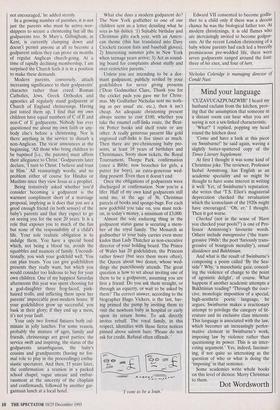Mind your language
`CUZAVUCAZPUMZWIB!' I heard my husband exclaim from the kitchen, prov- ing that the assumption that someone in a distant room can hear what you are saying is not a sex-linked characteristic.
`What?' I replied, popping my head round the kitchen door.
`Come and have a look at this piece on Swinburne!' he said again, waving a slightly butter-spattered copy of the Times Literary Supplement.
At first I thought it was some kind of Christmas joke. The reviewer, Professor Isobel Armstrong, has English as an academic speciality and so might be thought to have some interest in writing it well. Yet, of Swinburne's reputation, she writes that 'T.S. Eliot's magisterial deprecation checked the revaluation which the iconoclasm of the 1920s might have encouraged.' `Oh, er,' I thought. Then it got worse.
Checked (not in the sense of 'Have you checked your pools?') is one of Pro- fessor Armstrong's favourite words. Others include transgressive (`the trans- gressive 1960s'; the poet 'furiously trans- gressive of bourgeois morality'), sexual dissidence and Bakhtinian.
And what is the result of Swinburne's composing a poem called 'By the Sea- side'? Why, 'a masochistic gaze, conced- ing the violence of change to the point of agonistic delight', of course. What happens if another academic attempts a Bakhtinian reading? 'Through the coer- cive, monologic imposition of a special, high-aesthetic poetic language, he argues, Swinburne makes a reactionary attempt to privilege the category of lit- erature and its exclusive class interests. This language is associated with the law, which becomes an increasingly perfor- mative element in Swinburne's work, imposing law by violence rather than questioning its power. This is an inter- esting argument.' Yes, indeed, fascinat- ing, if not quite so interesting as the question of who or what is doing the `imposing' in that sentence.
Some academics write whole books on this level of diction. Merry Christmas
to them. Dot Wordsworth










































































































 Previous page
Previous page